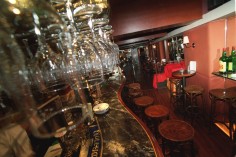Blue Note Club to expand in Asia, which may boost Hong Kong jazz
New York institution plans to open in three Chinese cities, offering hope that musicians playing those venues will want to stop off for a gig or two in Hong Kong

The news that New York's Blue Note Entertainment Group intends to open jazz clubs in China has created a buzz among fans of the music.
Blue Note is not new to Asia. It established its first franchised operations in Japan, the Blue Note Tokyo in Aoyama, in 1988 - just seven years after the parent operation opened in New York's Greenwich Village. Similar venues were established afterwards in Fukuoka, Nagoya and Osaka. Although Nagoya is still in business, the other two have closed.
There has also been a Blue Note Club in Milan since 2003, but the group now seems to believe the time is right for more aggressive international expansion. Group president Steven Bensusan is talking of setting up shop in Paris and London, and the group has announced that new clubs will open in Beijing and Hawaii in 2016.
Blue Note clubs are also planned for Shanghai, Taipei and possibly Seoul. Given the liveliness of the Shanghai jazz scene in relation to the rather more sedate one in Beijing, the choice of the capital for the first Blue Note in China is interesting, but presumably joint venture partner Winbright Culture and Media has its reasons.
Hong Kong is unfortunately not on their list of cities of interest - I fear for fairly obvious reasons. A similar venture was tried here with The Jazz Club in Lan Kwai Fong, and although many of us have fond memories of it, ultimately it failed.

That isn't to say that another dedicated jazz venue couldn't work here - but probably one a lot less glitzy than the Blue Note and more along the lines of, say, the much more venerable and distinctly more bohemian Village Vanguard, also in Greenwich Village, which celebrated its 80th birthday in February.
However, it is probably the Blue Note rather than the Village Vanguard model on which most successful jazz clubs of the future will be based.
If Blue Note does go to London, it will be competing head to head with Ronnie Scott's in Soho - a club run for decades on "by musicians, for musicians" principles in a very Village Vanguard-like manner.
Unquestionably one of the greatest jazz clubs in the world in its heyday, Ronnie Scott's turns 56 this year, but since reopening in 2006 after undergoing a change of ownership and a renovation, it has more closely resembled Blue Note, with an F&B emphasis and a booking policy that stresses big names, and leaves a fair amount of room for performers with little jazz content.

Still, that is not to say that the Blue Note clubs have been bad for jazz, or that no benefits have been passed on to people who can't afford to hang out too often in what are expensive nightclubs.
For the past five years, the New York club has also organised the Blue Note Jazz Festival, a programme of predominantly jazz and blues gigs, spread across several different venues around the city. It claims typical attendance at those of about 50,000 people every year. This year's festival ran from June 1 to 30 and featured artists ranging from Natalie Cole to Buddy Guy, The Bad Plus, Joshua Redman, Roy Hargrove, Ginger Baker, Abdullah Ibrahim and many more.
The group has also put money into documenting jazz, starting with live albums recorded at the club, but extending to studio recordings from artists such as McCoy Tyner, Kenny Werner, Gil Goldstein and Donald Harrison, all released on its own Half Note label.
It is also true that connections between Blue Note clubs in the US, Europe and Japan have created a network for touring artists. Bensusan has said he wishes to extend this with the new ventures in China and Hawaii next year.
Plans for the Chinese clubs also include featuring local artists "at least once a week", but presumably the big draws will be international performers, some of whom, with luck, may want to fit in a gig or two somewhere in Hong Kong on their way. We can but hope.
A trio of fine albums recorded live at Blue Note in New York and released on its Half Note label.
(2000, Half Note): the Paquito D'Rivera Quintet with guest Oriente Lopez on flute were captured on sizzling form at the club, and the CD picked up the 2001 Latin Grammy award for best Latin jazz album.
(2004, Half Note): a stellar band led by drummer Elvin Jones recorded over two nights in September 1999. The horn section includes Robin Eubanks on trombone and Michael Brecker on tenor saxophone.
(2014, Half Note): trombonist Conrad Herwig has recorded a series of live albums at Blue Note, presenting the music of jazz artists he admires, given a Latin slant. This is the most recent, and follows on from similarly themed tributes to John Coltrane, Miles Davis, Herbie Hancock and Wayne Shorter.

